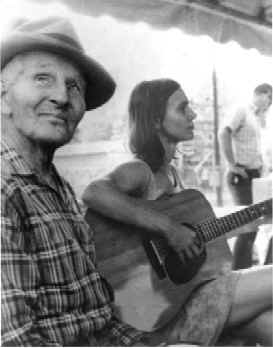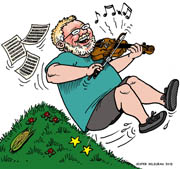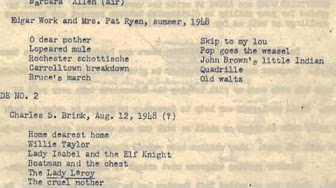|
Digital Collections in The Library Of Congress
The Library of Congress is not only the nation's oldest federal cultural institution,
it is also the largest library in the world, with millions of resource items
in its collections. An increasing number of these are becoming available for
|

Henry Reed with Bobbie Thompson of the Hollow Rock String Band (1967)
|
|
experiencing online at the Library of Congress website, with free and open access to historic
maps, photos, documents, audio and video. A subsection Collections
with Audio Recordings includes over 40 collections of articles, photographs, video,
and music recordings. Among these is a collection titled Fiddle
Tunes of the Old Frontier: The Henry Reed Collection.
Henry Reed was a fiddler from Monroe County, West Virginia,
who lived from 1884 to 1968. He never performed as a professional musician,
or recorded commercially, but has become known for preserving the music
of his life and his culture through these archival recordings, now
accessible for everyone to hear online. Read articles, view photographs of
his life, listen to over
180 audio files of Henry playing his tunes collected
by folklorist Alan Jabbour in 1966-67. Also view a video of Mr. Jabbour
demonstrating Henry's bowing technique.
Be sure to also explore the many other collections available
from the Library. Other topics include:
African-American
Band Music & Recordings, 1883-1923
Alan
Lomax Collection of Michigan and Wisconsin Recordings
The
Library of Congress Celebrates the Songs of America
National Jukebox
Now
What a Time: Blues, Gospel, and the Fort Valley Music Festivals, 1938-1943
Southern
Mosaic: The John and Ruby Lomax 1939 Southern States Recording Trip
|
|
Slippery Hill (Larry Warren) has posted MP3s of the entire
Milliner/Koken collection
|

|
|
Larry Warren of http://slippery-hill.com/
began maintaining a public digital collection of C, F, and Bb tunes in
2005. He has now added to his site digital audio versions of most or all of the 1404 fiddle tunes in Claire Milliner and Walt Koken’s
collection, and the Slippery Hill site has grown to nearly 3500
tunes.
For more background on this project, please read
this interview by Jon Bekoff at Oldtimeparty
And of course, visit https://www.slippery-hill.com/about
"When you see Larry, please give him a warm
thank you.”
|
|
Hetzler's
Fakebook
|

|
|
A
fakebook is a musicians resource. It consists of simple melody lines in
standard notation. This site presents hundreds of fiddle tunes in MIDI format, a
file system that can easily be played by computers with synthesized sound.
Unlike mp3s, which are compressed versions of live recordings, MIDI uses a
much smaller amount of file space, but the sound is computer generated,
like listening to an old fashioned music box. However, I find the versions
of tunes on this site to be very well done, capturing a fun spirit that
makes the tunes work. At the very least, it is a fine resource for helping
to remember how a tune goes, or motivating you to find a live version of
tunes that you find interesting.
Another advantage of MIDI is that it can
be converted to sheet music. The software for doing this is also available for
download at this site.
|
|
The
Samuel Preston
Bayard papers
1935-1996
Traditional tunes
and songs from SW Pennsylvania
|


|
|
Famed folklorist Samuel Preston Bayard
conducted fieldwork collecting folk music even before he enrolled at the
Pennsylvania State College. Between 1928 and 1963, Samuel Bayard and his
collaborators traveled throughout southwestern Pennsylvania collecting and
transcribing nearly 1000 traditional folk tunes. Their intent was to show
something of what the older Pennsylvania tradition really consisted of -
"pre-radio, pre-tape, pre-TV" Their sources were largely country
dance fiddlers and singers, as well as fifers, who carried on a once
widespread but now relatively obscure tradition of American marching
music.
Bayard began using tape recording in the
1940s as an aid to his transcription method. In recent years these
recordings have been digitized and are available for listening on YouTube.
The collection consists of folklore research materials
that consists of 61 audio recordings of fiddle tunes, fife tunes, and folk songs along with transcriptions,
correspondence, fieldwork, source work notes and texts, and manuscripts.
The
Samuel Preston Bayard papers, 1935-1996
|
|
Do you know any other
great websites with Old Time music resources, broadcasts or MP3's?
Send them to
thenewoldtimes@appalachianmusic.net
and we'll post them on this site. If you would like to include your
personal reviews that would be even better!
|
|